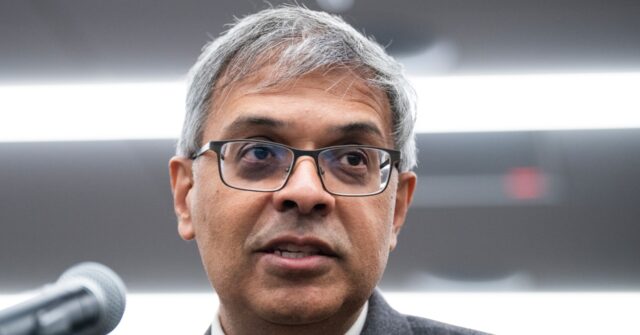Dr. Jay Bhattacharya, Donald Trump’s nominee as director of the National Institutes of Health (NIH), credits his Christian faith with sustaining him amidst the abuse he suffered during the pandemic for his refusal to kowtow to Anthony Fauci and the coercive “scientific consensus.”
One of the three principal co-authors of the watershed Great Barrington Declaration, Bhattacharya was deprecated for his opposition to lockdowns and his insistence on fact-based solutions to the coronavirus disease rather than blanket, politically motivated remedies.
Bhattacharya, who challenged popular assumptions about immunity, says his life was “completely overturned” during the pandemic. He received death threats and “couldn’t eat or sleep for months,” losing 30 pounds in the process.
Francis Collins, NIH director at the time, called Bhattacharya and his colleagues “fringe epidemiologists” in an email to Anthony Fauci, and called for “a quick and devastating published take down” of the Great Barrington Declaration.
Along with his scientific grounding, Bhattacharya says he was able to maintain his sanity during this trying ordeal thanks to his Christian faith. Raised Hindu, he became a Presbyterian as a senior at Claremont High School in Southern California.
“I’m a Christian,” he says in a recent interview with the Wall Street Journal. “That definitely played a role in giving me strength.”
Bhattacharya says he used to believe that “what made someone important, what gave them moral worth, almost, was how smart they were,” but now he sees “how evil that idea was.”
This kind of “hubris around your accomplishments, your intelligence, is immoral. Sinful even,” he says, which helped immunize him against attacks on his intelligence when he questioned the establishment’s answers to the pandemic.
The arrogance of Anthony Fauci and other leaders of the scientific establishment led to grave wrongs against the American people, he suggests, such as “denial of basic scientific facts like immunity” and “denial of basic human rights — the rights to bodily autonomy, to informed consent, to free speech.”
These violations were “embraced by scientists as necessary to control the pandemic, and they weren’t.”
Bhattacharya attributes the errors made to “a relatively small group of scientists during the pandemic deciding that any dissent against their ideas was so dangerous that they weren’t going to permit it.”
This led to a “groupthink that is anathema to science. It’s also anathema to civil society,” he says.
Fauci, in particular, came to see himself as the personification of science, declaring of his critics in November 2021 that “they’re really criticizing science because I represent science.”
Because of these abuses, Americans came to see “the scientific establishment as essentially an authoritarian power sitting over them, rather than as a force for good,” Bhattacharya asserts.
Bhattacharya was vindicated in September 2023, when a federal court of appeals found that the White House — as well as the Centers for Disease Control and Prevention (CDC), the FBI, and the surgeon general — had violated the First Amendment by using social media to suppress Bhattacharya’s speech.
“We were just acting as scientists, but almost immediately, we were censored,” Bhattacharya said at the time. “Google de-boosted us. Our Facebook page was removed. It was just a crazy time.”
“The government had a vast censorship enterprise,” he said. “It was systematically used to threaten and coerce and jawbone and tell all these social media companies, ‘You better listen to us: Censor these people, censor these ideas, or else.’”
In standing up to groupthink, or what came to be known as the “scientific consensus,” Bhattacharya has joined a long line of outstanding scientists who made a difference precisely because they were willing to stand up to their colleagues and think outside of the box.
Scientists like Copernicus, Galileo, Newton, Einstein, Darwin, Mendel, Pasteur, and Mendeleev made astronomical contributions to scientific knowledge by proposing novel new paradigms, often suffering ostracization and harassment for their new ideas.
Looking back, Bhattacharya says he is “amazed” by the way things have turned out.
“I had the head of the NIH . . . try to destroy me, and now I have the opportunity to lead this organization,” he says. “I think the main thing is that I know what abuse of power in this position looks like, having been exposed to it, and I will never do that.”
As the new director of the NIH, Bhattacharya says he wants to help restore the trust in health experts and the scientific establishment, which has been squandered “primarily because they utterly failed during Covid.”
America’s scientific institutions must ensure that they “work for the people again,” Bhattacharya declares.
Scientists “need to remember that they are servants of the American people,” he says. “The people are the ones paying the bills.”
“We scientists serve the people, not the other way around,” he adds.



